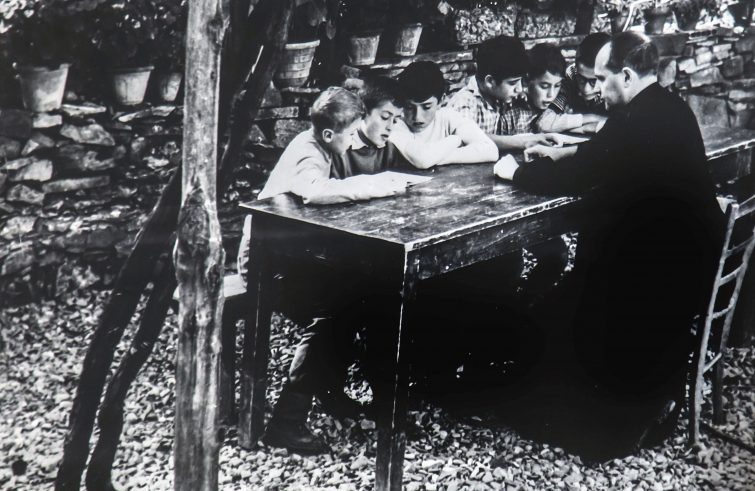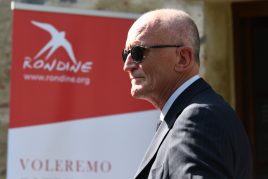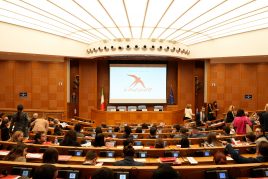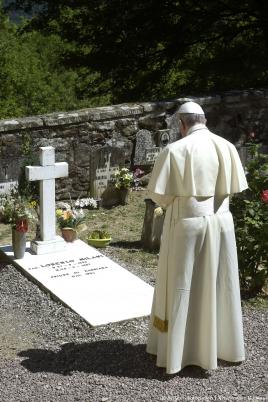
From Barbiana, a remote hamlet in the mountainous area of Vicchio, in Tuscany’s Mugello region, to Rondine, a small medieval village near Arezzo.
 Interviewed by SIR, Franco Vaccari, founder and president of “Rondine Peace Citadel”, describes the ways in which Don Lorenzo Milani, priest, educator and writer, inspired the activities of his organisation devoted to reducing armed conflicts worldwide. Last May 27, Italy’s President Sergio Mattarella visited Barbiana to celebrate the 100th anniversary of the birth of the priest (1923-2023) who died when he was only 44 years old. This visit came in the wake of that of Pope Francis on June 20, 2017, in recognition of his efforts to educate the poor, which formed the subject of the book “Letter to a teacher.”
Interviewed by SIR, Franco Vaccari, founder and president of “Rondine Peace Citadel”, describes the ways in which Don Lorenzo Milani, priest, educator and writer, inspired the activities of his organisation devoted to reducing armed conflicts worldwide. Last May 27, Italy’s President Sergio Mattarella visited Barbiana to celebrate the 100th anniversary of the birth of the priest (1923-2023) who died when he was only 44 years old. This visit came in the wake of that of Pope Francis on June 20, 2017, in recognition of his efforts to educate the poor, which formed the subject of the book “Letter to a teacher.”
The priest inspired by Don Milani. “As a young man, I had the good fortune to have as teacher of religion a priest from the Tuscan-Emilian Apennines, whom I could rightly describe as being ‘inspired by Don Milani’. He suggested that together with other students I should promote after-school activities for primary school children from peasant families living in the rural areas near Arezzo. I was born into a middle-class family – Vaccari explained – and seeing that rural world was a tremendous discovery, which made me aware of the gap that existed between the city and the surrounding rural areas. I realised that those children were not given the same opportunities that we had in the city. Thus, while I was teaching after-school activities, I came to know Don Milani. I met Don Lorenzo thanks to these young people from the rural areas surrounding Arezzo.”
 An inspiration for Rondine. “Don Milani’s mission was characterised by his passion for education and his commitment to social issues,” which, Vaccari recounts, “have been my life-long companions. In fact, when Rondine Peace Citadel was founded in 1976, I naturally incorporated them into that experience, which eventually resulted in the Rondine method, whereby young people from conflict zones throughout the world live together ‘with their enemy’, learning to deal with conflict management, becoming agents of change through concrete actions and projects. In the same way that Don Milani welcomed outcast young people from the Apennines in Barbiana, in Rondine we welcome young people marginalised by war, who are dying under the rubble of conflicts, ensnared in the dynamics of violence and hatred.”
An inspiration for Rondine. “Don Milani’s mission was characterised by his passion for education and his commitment to social issues,” which, Vaccari recounts, “have been my life-long companions. In fact, when Rondine Peace Citadel was founded in 1976, I naturally incorporated them into that experience, which eventually resulted in the Rondine method, whereby young people from conflict zones throughout the world live together ‘with their enemy’, learning to deal with conflict management, becoming agents of change through concrete actions and projects. In the same way that Don Milani welcomed outcast young people from the Apennines in Barbiana, in Rondine we welcome young people marginalised by war, who are dying under the rubble of conflicts, ensnared in the dynamics of violence and hatred.”
The Lesson of Don Milani. For the founder of the Rondine Peace Citadel, Don Milani’s motto ‘I care’ conveys a very powerful message: the care of relationships. “For us at Rondine, caring for others entails caring for the enemy of war. Enmity lurks in every relationship and this must be acknowledged.” Don Milani’s proposal is disruptive as it enshrines the theme of taking to heart the young person, the student before us.”
“Don Milani teaches us to start anew from the relationship with the realm of education, something that stems also from his priesthood.”
Starting anew from the relationship with the realm of education, Vaccari added, “is what we do at the Rondine branches located throughout Italy. In fact, school subjects are incorporated into the relationship with the realm of education. It all starts from here: if we fail to consider this aspect, we will not reach people’s hearts.
Relationships cannot help but thrive on conflict – understood as a positive dimension, not a negative one. Conflict is not a synonym for war; it stands for the clash between differences.
This is the bread and butter of education – let it suffice to mention the differences between pupil and teacher, between pupils themselves, or the daily challenges posed by the school environment. Schools are laboratories open to diversity, marked by daily conflicts. Facing this without being afraid is tantamount to human promotion and development.”
 The power of words. There is another important theme in Don Milani, that of words. Vaccari said: “Don Lorenzo entrusts us with the power of words, their force. Modern research shows that 10 years ago young people had a vocabulary of 1,500 words, but of only 500 today. This alone shows the extent to which poverty of speech is a factor of exclusion. Don Milani restored the wealth of words to the young people living in the Apennines, sons and daughters of local mountain dwellers. Today, as back then, even young people living in large urban areas and metropolises, owing to a poor use of the media, experience a poverty of words and of participation in public life, and thus become subjects.” In his book ‘Letter to a teacher’, the priest from Barbiana highlights the “gap between the rich and the poor” that mirrors the current situation: “Let us think of the state of poverty in the south of the world, of wealthy and poor living in the cities, of cultural wealth and cultural poverty, of economic wealth and economic poverty, of environmental wealth and environmental poverty. The poor are growing poorer and poorer all over the world, while the rich are growing richer and richer. These are disparities on which Don Milani would have focused his efforts today.”
The power of words. There is another important theme in Don Milani, that of words. Vaccari said: “Don Lorenzo entrusts us with the power of words, their force. Modern research shows that 10 years ago young people had a vocabulary of 1,500 words, but of only 500 today. This alone shows the extent to which poverty of speech is a factor of exclusion. Don Milani restored the wealth of words to the young people living in the Apennines, sons and daughters of local mountain dwellers. Today, as back then, even young people living in large urban areas and metropolises, owing to a poor use of the media, experience a poverty of words and of participation in public life, and thus become subjects.” In his book ‘Letter to a teacher’, the priest from Barbiana highlights the “gap between the rich and the poor” that mirrors the current situation: “Let us think of the state of poverty in the south of the world, of wealthy and poor living in the cities, of cultural wealth and cultural poverty, of economic wealth and economic poverty, of environmental wealth and environmental poverty. The poor are growing poorer and poorer all over the world, while the rich are growing richer and richer. These are disparities on which Don Milani would have focused his efforts today.”
“His heritage must be passed on – Vaccari concluded -: putting oneself at the service of the young. To serve the young without making use of them. Don Lorenzo used to say this about the poor. Young people are poor for want of future, as Pope Francis reminds us when he warns us not to steal young people’s future.”












